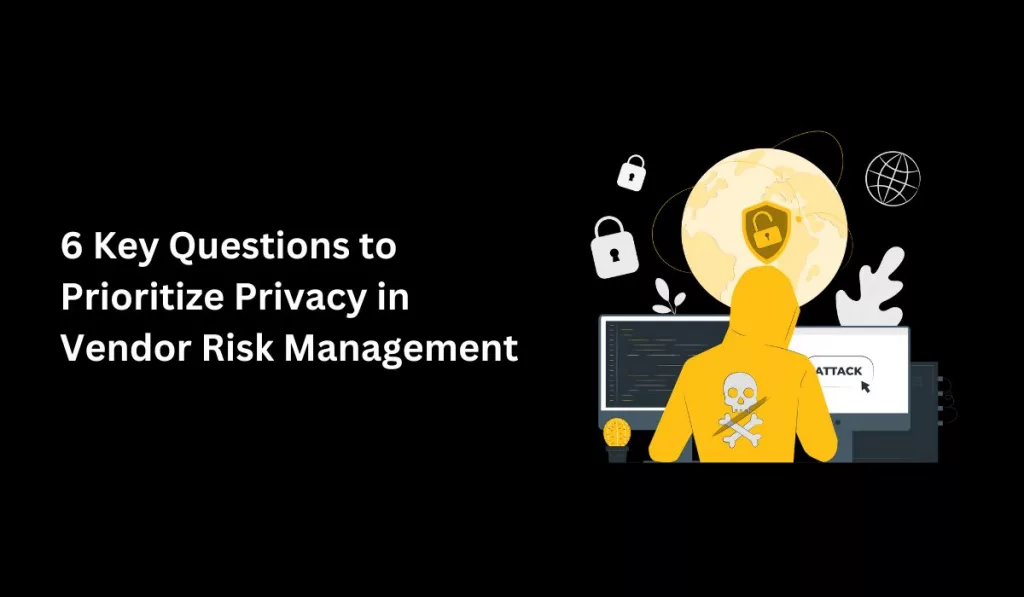Privacy plays a critical role in vendor risk management, particularly in the context of cybersecurity. Prioritizing privacy is essential for mitigating cyber risks as it helps safeguard sensitive data and protects against potential breaches. By focusing on privacy, organizations can enhance their overall security posture and maintain trust with customers and stakeholders.

Following are the 6 key questions that prioritize privacy in vendor risk management.
- Question 1: What Data Does the Vendor Handle?
- Question 2: How Secure is the Vendor’s Infrastructure?
- Question 3: What Privacy Controls Does the Vendor Have in Place?
- Question 4: How Does the Vendor Respond to Security Incidents?
- Question 5: What Measures Does the Vendor Take to Ensure Data Integrity?
- Question 6: How Does the Vendor Dispose of Data?
Question 1: What Data Does the Vendor Handle?
Understanding the types of data handled by vendors is crucial for several reasons:
- Risk Mitigation: Knowing what data vendors handle allows organizations to assess the potential risks associated with sharing sensitive information.
- Compliance: Different types of data have varying levels of sensitivity and are subject to different regulatory requirements. Understanding vendor-handled data helps ensure compliance with relevant laws and regulations.
- Data Classification: By categorizing data based on its sensitivity, organizations can implement appropriate security measures to protect it. This involves identifying sensitive data categories such as personally identifiable information (PII), financial data, intellectual property, etc., and understanding their privacy implications.
- Vendor Risk Assessment: Conducting vendor risk assessments involves evaluating the risks and vulnerabilities associated with the types of data handled by vendors. This helps organizations make informed decisions regarding vendor selection and management.
Also read: 7 Tips to Protect Your Business from Cyber Threats
Question 2: How Secure is the Vendor’s Infrastructure?
Assessing the security of a vendor’s infrastructure is crucial for ensuring the protection of sensitive data and mitigating cybersecurity risks:
- Cybersecurity Practices: Evaluate the vendor’s cybersecurity practices, including their policies, procedures, and adherence to industry standards and best practices.
- Infrastructure Security: Examine the security measures implemented within the vendor’s infrastructure, such as firewalls, encryption protocols, access controls, and monitoring systems.
- Importance of Evaluation: Assessing the vendor’s security measures is essential to identify potential vulnerabilities and ensure that adequate controls are in place to protect against threats.
- Thorough Assessments: Conduct comprehensive security risk assessments and audits to identify, prioritize, and address security risks effectively.
- Continuous Monitoring: Implement continuous monitoring processes to regularly assess the vendor’s security posture and respond promptly to emerging threats or vulnerabilities.
Also read: Discover World’s Top Cybersecurity Companies
Question 3: What Privacy Controls Does the Vendor Have in Place?
Assessing the privacy controls of vendors is vital to ensure the protection of sensitive data and compliance with regulations:
- Privacy Regulations: Understand relevant privacy regulations such as GDPR, CCPA, and HIPAA to establish a framework for evaluating vendor compliance.
- Privacy Policies Evaluation: Review the vendor’s privacy policies to ensure they align with regulatory requirements and industry best practices. Look for transparency, data handling procedures, and mechanisms for user consent.
- Compliance Monitoring: Regularly monitor vendor compliance through assessments, audits, and performance reviews. Ensure vendors have the necessary controls in place to mitigate privacy risks.
- Risk Mitigation: Collaborate with vendors to address privacy risks effectively. Work together to implement mitigating controls and establish protocols for incident response and data breach notification.
- Continuous Improvement: Encourage continuous improvement in privacy practices by fostering open communication, providing resources for training and education, and incentivizing adherence to privacy best practices.
Also read: Cyber attack: Exploring the consequences of data privacy breaches
Question 4: How Does the Vendor Respond to Security Incidents?
Vendor incident response capabilities are crucial for mitigating cybersecurity risks and minimizing the impact of security incidents:
- Importance of Incident Response: Effective incident response capabilities allow vendors to detect, contain, and mitigate security incidents promptly, reducing the potential damage to systems, data, and reputation.
- Vendor Incident Response Plans: Evaluate vendor incident response plans and procedures to ensure they align with industry best practices and regulatory requirements. Look for documented processes for incident detection, analysis, containment, eradication, and recovery.
- Communication Channels: Establish clear communication channels with vendors to facilitate incident reporting and coordination. Define roles, responsibilities, and escalation procedures to ensure swift and effective responses to security incidents.
- Incident Response Protocols: Collaborate with vendors to develop incident response protocols tailored to specific scenarios and risks. Conduct regular training and tabletop exercises to ensure readiness and alignment with response procedures.
Also read: The Human Factor: Training and Culture in Cybersecurity
Question 5: What Measures Does the Vendor Take to Ensure Data Integrity?
Ensuring data integrity is paramount for safeguarding privacy and maintaining trust in data handling processes:
- Importance of Data Integrity: Data integrity ensures the accuracy, consistency, and reliability of data, crucial for maintaining privacy and preventing unauthorized alterations that could compromise sensitive information.
- Vendor Data Handling Processes: Evaluate vendor data handling processes to ensure they incorporate robust measures for maintaining data integrity. Look for encryption protocols, access controls, audit trails, and data validation mechanisms to prevent tampering and unauthorized access.
- Integrity Measures: Assess the integrity measures implemented by vendors, such as checksums, hashing algorithms, and data validation checks. These measures help verify data accuracy and detect any unauthorized alterations or corruption.
- Verification Strategies: Implement strategies for verifying data accuracy, including regular audits, data validation processes, and integrity checks. Utilize monitoring tools and anomaly detection mechanisms to identify any discrepancies or integrity issues promptly.
Also read: Why Integrated Technology is Important for Company Data Security
Question 6: How Does the Vendor Dispose of Data?
Secure data disposal practices are essential to protect sensitive information and comply with regulations:
- Importance of Secure Disposal: Proper data disposal prevents unauthorized access to sensitive data and reduces the risk of data breaches. It ensures compliance with privacy regulations and maintains trust with stakeholders.
- Vendor Data Disposal Policies: Evaluate vendor data disposal policies to ensure they align with industry standards and regulatory requirements. Look for documented procedures for secure data destruction, including certificates of sanitization and compliance with standards like ISO 27001.
- Procedures for Data Disposal: Examine vendor procedures for data disposal, such as media disposal methods and equipment sanitization. Ensure vendors follow protocols for secure data erasure or destruction, minimizing the risk of data exposure.
- Guidance for Vendors: Provide vendors with guidance on proper data destruction methods, emphasizing the importance of data security and compliance. Encourage the adoption of secure data disposal practices, such as data erasure techniques and physical destruction of storage media, to protect sensitive information.
Final words
Privacy is critical in vendor risk management, particularly in cybersecurity. By prioritizing privacy, organizations effectively mitigate cyber risks, safeguard sensitive data, and maintain stakeholder trust. Key areas within vendor risk management include understanding data handling, evaluating vendor infrastructure security, assessing privacy controls, vendor incident response, data integrity measures, and secure data disposal practices. These strategies collectively ensure the comprehensive management of vendor risk and the protection of sensitive data.










Leave a Reply